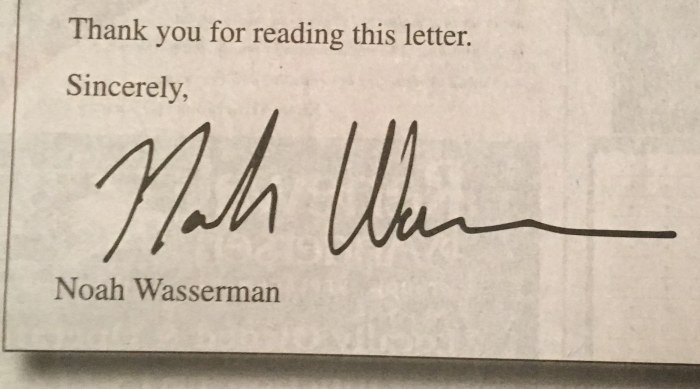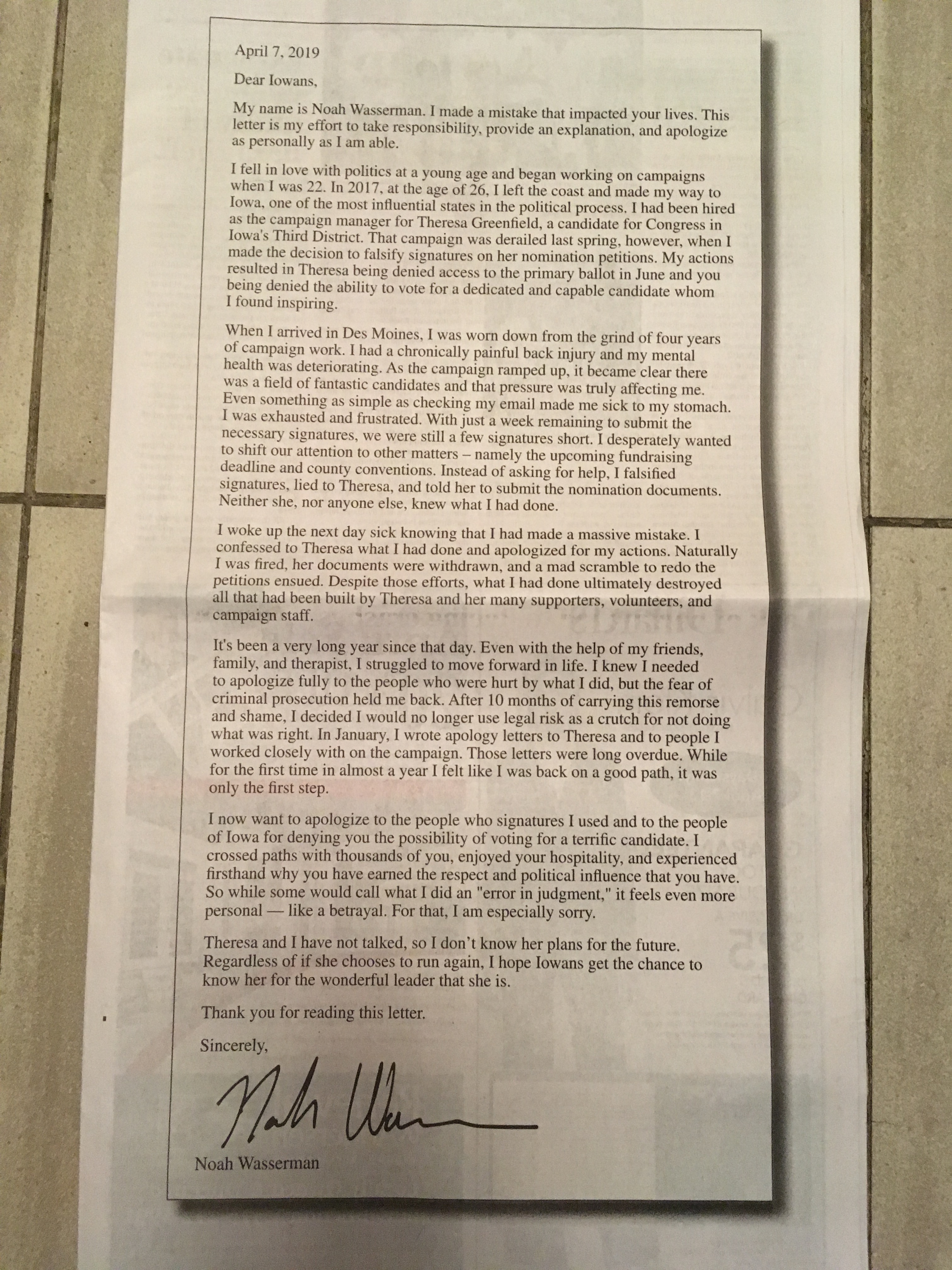“My name is Noah Wasserman. I made a mistake that impacted your lives.”
A year after Theresa Greenfield failed to qualify for the Democratic primary ballot in Iowa’s third Congressional district, her former campaign manager apologized in an unprecedented full-page advertisement in the Sunday Des Moines Register.
Wasserman’s account of how he derailed a promising candidacy conveys valuable lessons not only for people working in politics, but for anyone who feels overwhelmed by tasks at hand.
Here are the key paragraphs from the open letter (enclosed in full below).
When I arrived in Des Moines [in 2017], I was worn down from the grind of four years of campaign work. I had a chronically painful back injury and my mental health was deteriorating. As the campaign ramped up, it became clear there was a field of fantastic candidates and that pressure was truly affecting me. Even something as simple as checking my email made me sick to my stomach. I was exhausted and frustrated. With just a week remaining to submit the necessary signatures, we were still a few signatures short. I desperately wanted to shift our attention to other matters namely the upcoming fundraising deadline and county conventions. Instead of asking for help, I falsified signatures, lied to Theresa, and told her to submit the nomination documents. Neither she, nor anyone else, knew what I had done.
I woke up the next day sick knowing that I had made a massive mistake. I confessed to Theresa what I had done and apologized for my actions. Naturally
I was fired, her documents were withdrawn, and a mad scramble to redo the petitions ensued. Despite those efforts, what I had done ultimately destroyed all that had been built by Theresa and her many supporters, volunteers, and campaign staff.
Greenfield submitted her papers on March 14, two days before the 2018 filing deadline. She later said she had learned about problems with her petitions on Thursday night, March 15. A small army of volunteers were unable to collect enough valid signatures the following day to get Greenfield on the ballot.
An unusual procedural move to invoke an obscure provision of Iowa law failed when Attorney General Tom Miller advised Secretary of State Paul Pate not to certify Greenfield as “an additional primary election candidate.”
More than 30 years had passed since a leading contender for an Iowa Congressional primary did not make the ballot. Greenfield had attracted some sought-after and high-profile supporters and was rumored to be the preferred candidate for the Democratic Congressional Campaign Committee.
The surprising collapse of her prospects greatly changed the dynamic of the primary. With Greenfield, two men and two women would have competed for the nomination. EMILY’s List, a group promoting pro-choice Democratic women candidates, might have stayed out.
Instead, Cindy Axne faced Pete D’Alessandro and Eddie Mauro in a year when Democratic voters favored women over men in numerous competitive primaries both in Iowa and around the country (see here, here, and here). EMILY’s List endorsed Axne in early April and invested in a large direct mail and television advertising effort the following month.
Greenfield has not revealed her future plans but is widely seen as a possible candidate for U.S. Senate in 2020. Asked for comment on Wasserman’s letter, she provided this statement to Bleeding Heartland on April 7.
You never go wrong doing the right thing. And while the events of March 2018 can not be undone, I’ll never regret withdrawing my petition. I will forever be grateful to supporters and Iowans for lending a hand, scrambling to get signatures and helping me resubmit my petition to be on the Democratic primary ballot. Noah’s apology and acceptance of responsibility for his actions is a necessary first step for him. It’s the right thing to do.
Some local Democrats speculated that the Des Moines Register advertisement was designed to deflect blame from Greenfield, in case she challenges Senator Joni Ernst. But it was already obvious that Greenfield never intended to submit fraudulent papers. I take Wasserman at his word that this letter is part of his own healing process.
Everyone can learn from his missteps. The two biggest lessons:
Ask for help.
Greenfield’s endorsers included people with tremendous inside knowledge, such as former two-time statewide candidate Roxanne Conlin, Tom Jochum, and Julie Stauch (the last two had managed or worked on many competitive Democratic primary campaigns). When Wasserman started falling behind on essential tasks, he could have sought their guidance. One of Iowa’s most politically engaged labor unions, AFSCME, was also supporting Greenfield and could have collected hundreds of signatures around the district in a matter of days.
In addition, Greenfield had raised hundreds of thousands of dollars by the end of 2017. The campaign could have paid for signature collection services.
Work with people who complement your weaknesses.
A veteran of many campaigns told me last year that you can have an inexperienced candidate or an inexperienced campaign manager, but not both. Greenfield had never run for office, and Wasserman had never led such an operation.
A candidate who had been deeply involved with other races would have checked in periodically on how the petitions were going, starting months before the deadline. A snowstorm reduced turnout for the Democratic precinct caucuses in early February, where many candidates for statewide or Congressional offices had petitions set out. That should have prompted internal discussions on developing a plan to reach the signature goal by mid-March.
An experienced candidate also would not have submitted nominating papers with barely enough signatures to qualify. Greenfield relied on Wasserman’s assurances that everything was in order. But Iowa Starting Line reviewed the first set of petitions for Greenfield and found,
It appears she only had two signatures over the minimum requirement for Adams County, two over for Taylor County, four over in Union County and five over in Page County. It also seems she only had the minimum requirement for exactly eight counties, meaning she would have missed the ballot had just one of those contained just a few duplicates or errors.
Most campaigns submit hundreds or thousands of extra signatures, knowing that some could be invalidated for various reasons. Had Greenfield realized on March 14 that something was off, she could have rallied the troops sooner and easily cleared the threshold. She only missed the mark by a few hundred signatures after starting from scratch with hours to go.
Any relevant comments are welcome in this thread.
Full text of page 9A of the Sunday Des Moines Register on April 7:
My name is Noah Wasserman. I made a mistake that impacted your lives. This letter is my effort to take responsibility, provide an explanation, and apologize as personally as I am able.
I fell in love with politics at a young age and began working on campaigns when I was 22. In 2017, at the age of 26, I left the coast and made my way to Iowa, one of the most influential states in the political process. I had been hired as the campaign manager for Theresa Greenfield, a candidate for Congress in Iowa’s Third District. That campaign was derailed last spring, however, when I made the decision to falsify signatures on her nomination petitions. My actions resulted in Theresa being denied access to the primary ballot in June and you being denied the ability to vote for a dedicated and capable candidate whom I found inspiring.
When I arrived in Des Moines, I was worn down from the grind of four years of campaign work. I had a chronically painful back injury and my mental health was deteriorating. As the campaign ramped up, it became clear there was a field of fantastic candidates and that pressure was truly affecting me. Even something as simple as checking my email made me sick to my stomach. I was exhausted and frustrated. With just a week remaining to submit the necessary signatures, we were still a few signatures short. I desperately wanted to shift our attention to other matters namely the upcoming fundraising deadline and county conventions. Instead of asking for help, I falsified signatures, lied to Theresa, and told her to submit the nomination documents. Neither she, nor anyone else, knew what I had done.
I woke up the next day sick knowing that I had made a massive mistake. I confessed to Theresa what I had done and apologized for my actions. Naturally I was fired, her documents were withdrawn, and a mad scramble to redo the petitions ensued. Despite those efforts, what I had done ultimately destroyed all that had been built by Theresa and her many supporters, volunteers, and campaign staff.
It’s been a very long year since that day. Even with the help of my friends, family, and therapist, I struggled to move forward in life. I knew I needed to apologize fully to the people who were hurt by what I did, but the fear of criminal prosecution held me back. After 10 months of carrying this remorse and shame, I decided I would no longer use legal risk as a crutch for not doing what was right. In January, I wrote apology letters to Theresa and to people I worked closely with on the campaign. Those letters were long overdue. While for the first time in almost a year I felt like I was back on a good path, it was only the first step.
I now want to apologize to the people who signatures I used and to the people of Iowa for denying you the possibility of voting for a terrific candidate. I crossed paths with thousands of you, enjoyed your hospitality, and experienced firsthand why you have earned the respect and political influence that you have. So while some would call what I did an “error in judgment,” it feels even more personal–like a betrayal. For that, I am especially sorry.
Theresa and I have not talked, so I don’t know her plans for the future. Regardless of if she chooses to run again, I hope Iowans get the chance to know her for the wonderful leader that she is.
Thank you for reading this letter.
Sincerely,
Noah Wasserman
UPDATE: Brianne Pfannenstiel reported for the Des Moines Register on April 16 that Wasserman “was booked at the Polk County Jail Tuesday afternoon and was released shortly afterward.”
He was charged with one count of election misconduct in the first degree, a class D felony, and 13 counts of tampering with records, which are aggravated misdemeanors.


